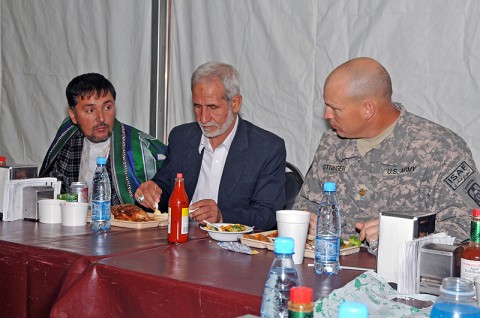Written by Sgt. 1st Class Peter Mayes
101st Sustainment Brigade, 101st Airborne Division (AA) Public Affairs


Forward Operating Base Deh Dadi II, Afghanistan – In U.S. Southern culture, it is a common practice to develop relationships over food; that is, the art of sitting down at a table and bonding over a hot meal.
The 530th Combat Sustainment Support Battalion Commander’s Emergency Response Program team took a page out of the book of Southern hospitality and invited Deh Dadi District Deputy Subgovernor Mohammad Akbar Askadabi and several local Afghan leaders to lunch at Forward Operating Base Deh Dadi II dining facility.

“When we go out and meet the Afghans in their areas, they extend their hospitality to us. We’re on their turf feeding us Chai tea and traditional Afghan meals, and I thought it was important for us to show them some of our hospitality back,” said Maj. John Stringer, battalion executive officer.
“Additionally, the meetings themselves as far as CERP goes ensures that we have a lead on these projects that they want and that their wants come out.”
The CERP team provided Askadabi and the village elders with a request sheet asking them to list what projects they needed in their villages.
The groups also discussed a proposed humanitarian relief effort to the neediest people in their respective villages, as well as the status of two of the water-well projects.
“Doing projects for them that we believe they want done is not good business,” Stringer said.
The meal itself was simple enough. The Afghan leaders treated themselves to servings of chicken, vegetables and pasta, as well as fruit and pastries from the dessert table in the DFAC. Some of the leaders added some Texas Pete hot sauce they found on the table to their food, giving it that extra spicy kick they were wanting.
Stringer said the lunch harkens back to the belief that people are more willing to do business with someone that they have something in common with.
“Back home, when someone treats you to lunch, the custom is you go back and return the favor,” he said. “We don’t have our families here, but we wanted to share the experience with them of what we do.”
Breaking bread and forming relationships wasn’t the only thing on the agenda. The two sides also discussed current and future CERP projects. To date, the team has worked with the district on various projects, including five schools, two hospitals, several deep water wells, and a washroom for the local mosque.
The hospitality was not lost on the Afghan leaders. Askadabi said while he and his entourage enjoyed the meal, the most important thing was the relationship being cultivated.
“The people in the village are feeling very good about the projects the CERP is doing for them,” Askadabi said. “If someone is really thirsty and you give him only one glass of water, how are they going to feel? They really need the hospitals and the schools, and we are very happy with the projects.”
“It is the same here in Afghanistan. If we invite someone to our house, and they taste the salt of our food, once they eat it, it means they are our brothers as long as we are alive and we will love him from the bottom of our hearts,” he said.


